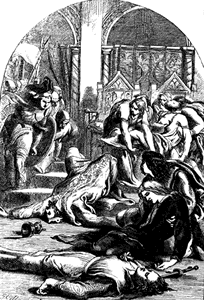![]()
The Election Lights on Fortinbras

Fortinbras follows the advice that would later be given by Francis Bacon. Unable to enforce his claim to the disputed lands, Fortinbras maintains it through legal petitions. At the end of the play, when he is able to support his claim - given the presence of his army and the disarray of the Danish court - he returns to it.
| FORTINBRAS:I have some rights of memory in this kingdom, Which now to claim my vantage doth invite me. HORATIO: Of that I shall have also cause to speak, (v.ii.190) |
Throughout the play, Fortinbras serves to provide a foil for Hamlet. His situation parallels Hamlet's: his father has also been murdered, and his claim to the throne also has been passed over in favor of his uncle. But Fortinbras does not seek revenge. He maintains his claim, and waits for his time to come. Eventually, when it does come, it comes with greater ease and greater rewards than he could have imagined.
| But I do prophesy th' election lights On Fortinbras. He has my dying voice. (V.ii. 337-8) |
Given the weakness of the Danish court, Fortinbras is now in a position to claim the rights to lands ceded in life tenancy to Hamlet's father. There is no reason to believe that the "rights of memory" to which he refers have anything to do with the succession to the Danish throne -- especially since Fortinbras was not present when Hamlet made his prophesy and cast his vote. Thus, when the play ends, the matter of the succession remains entirely unresolved.
One cannot help but appreciate the irony of Hamlet's dying voice. Fortinbras persists in his claim for a disputed patch of land held by Denmark, and without raising up arms against his foe, ends up becoming the king of the entire country. This irony is further fortified by the presence of the English ambassador who arrives in Fortinbras' company. This arrival has been foretold in Act IV when we learned that if Hamlet is to accomplish his revenge against Claudius, it has to take place before the arrival of the English ambassadors. Their arrival, in effect, sets a time limit on Hamlet's ability to complete the assignment given to him by the ghost in Act I.
| HORATIO: It must be shortly known to him from England What is the issue of the business there. HAMLET: It will be short; The interim's mine, And a man's life's no more than to say "one." (v.ii. 71-4) |
Ironically, the ambassadors arrive, in the company of FortInbras and his army, only about a minute or two after Claudius dies. Hamlet's window of opportunity closes only seconds after he passes through it.